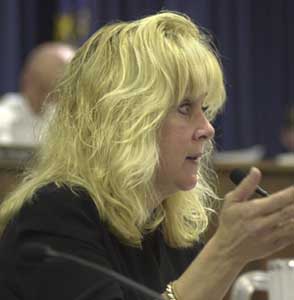-
- Dean admits stand on gay rights may cost votes
- Gay-rights activists seek stronger hate crimes law
- Group says South gets short shrift in AIDS money
- Gov. Davis signs AB205
- Law schools sue Department of Defense
- Former San Francisco health commissioner prosecuted for HIV infection
- IU chancellor condemns professor’s anti-gay web log
- It’s not your father’s fraternity
- National News Briefs
- World News Briefs
national
Gay-rights activists seek stronger hate crimes law
Legislature less than enthusiastic
Published Thursday, 25-Sep-2003 in issue 822
LOUISVILLE, Ky. (AP) — Gay-rights activists are pushing for a tougher state hate crimes law in response to the death of a gay Rineyville man.
Activists point to the death of Guinn “Richie” Phillips as evidence of the need for a more stringent hate crimes law.
Josh Cottrell, 22 is charged with murdering and robbing Phillips, whose body was stuffed into a suitcase and dumped in Rough River Lake. Phillips was strangled or suffocated, the medical examiner’s office said.
Three of Cottrell’s relatives told investigators that Cottrell told them he invited Phillips, 36, to his motel room June 17 to kill him because Phillips was gay, according to police records.
“Gay, lesbian, bisexual and transgender people in Kentucky, they are saying to themselves, ‘There is no difference between him and me. I could be a victim of that kind of crime just as easily as he was,’” said Andrea Hildebran, executive director of the Kentucky Fairness Alliance.
Supporters of strengthening the law say committing a hate crime should be a separate offense, and a crime committed because of hate should carry a tougher sentence. Even in cases of murder, they say, a separate offense when the victim is chosen because of race or sexual preference would send a message that the state will not tolerate having people feel vulnerable.
Committing crimes such as intimidation, assault and vandalism against someone because of their race, religion, ethnic origin or sexual orientation has been a violation of Kentucky law since 2000.
The law, however, does not apply to murder, and it carries only minor sanctions in cases in which it does apply.
Currently, Kentucky’s law can be used only by a judge at sentencing to refuse motions for early release, so-called shock probation, or to deny parole or bail. It cannot be used to give a longer sentence or to increase the severity of a charge, and it is not considered an “aggravating factor” that can make a murder charge a capital offense.
Because Cottrell is charged with robbery, the Phillips case qualifies as a capital case. Commonwealth’s Attorney Kenton Smith has not said whether he will ask for the death penalty. But Smith said he won’t make Phillips’ sexual orientation a factor in the prosecution of Cottrell.
Kentucky State Police track reported hate crimes. But Brian Wright, a spokesman for Attorney General Ben Chandler, said no records are kept on how often defendants are charged with violating the hate crimes statute.
In 2000, the most recent year for which records are available, 73 hate crimes were reported to police agencies around the state.
Of those reports, 56 of the crimes involved victims who were targeted because of their race, and nine victims were targeted because of their sexual orientation. Most of the offenses were intimidation, vandalism and aggravated assault.
Gay activists say crimes whose victims were chosen because of their sexual orientation go largely unreported.
“For a gay or lesbian person to report a hate crime, it means basically coming out in your community,” Hildebran said. “That can be risky, especially if you were just a victim of crime because someone thought you were gay.”
Rep. Kathy Stein, D-Lexington, said the hate crimes law ought to be strengthened.
She said, however, that lawmakers are right in not giving in every time someone wants to make crimes carry more and more serious punishments.
In the last legislative session, Rep. Jesse Crenshaw, D-Lexington, introduced a bill that would have allowed, in some cases, juries to determine whether a hate crime had been committed. It would have also made a hate crime a felony. The bill never got a vote.
Beverly Watts, executive director of the Kentucky Commission on Human Rights, said that to have a real impact on serious cases such as murder, the commission of a hate crime would have to be considered what lawyers call an “aggravating circumstance.”
Under state law, murder alone is not a capital offense. To become a capital case, a murder must be committed in correlation with one of a number of so-called aggravators, such as kidnapping or robbery.
“I am here to tell you there is not a way in Hades in this General Assembly to get through a bill that would make crimes against homosexuals a trigger for the death penalty — not even with the enthusiasm some of my colleagues have for capital punishment,” Stein said.
Republican Rep. Joseph Fischer said he opposes hate crimes legislation because even though the U.S. Supreme Court has allowed them, he thinks they violate the constitutional guarantee that all citizens be afforded equal protection under the law.
|
|
Copyright © 2003-2025 Uptown Publications


